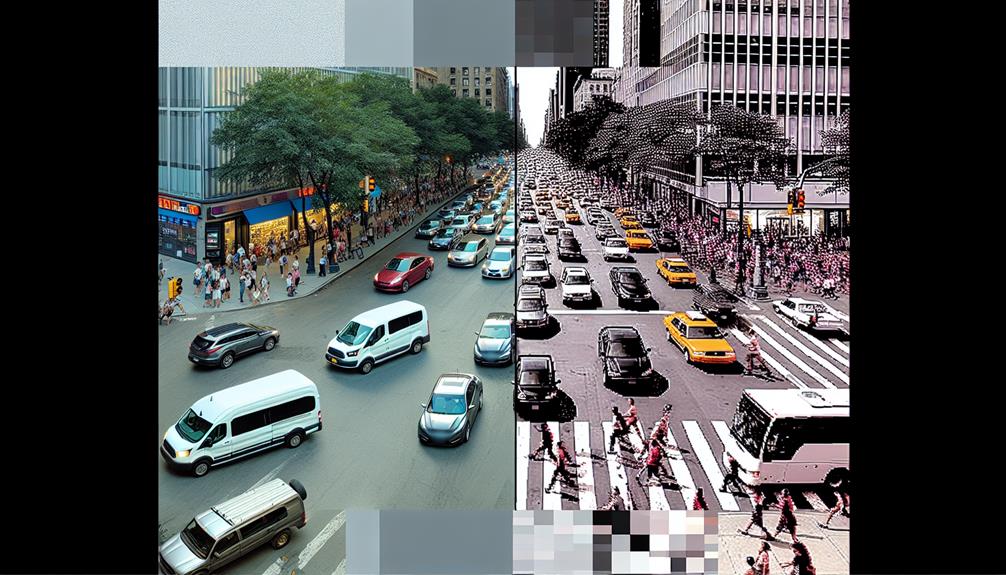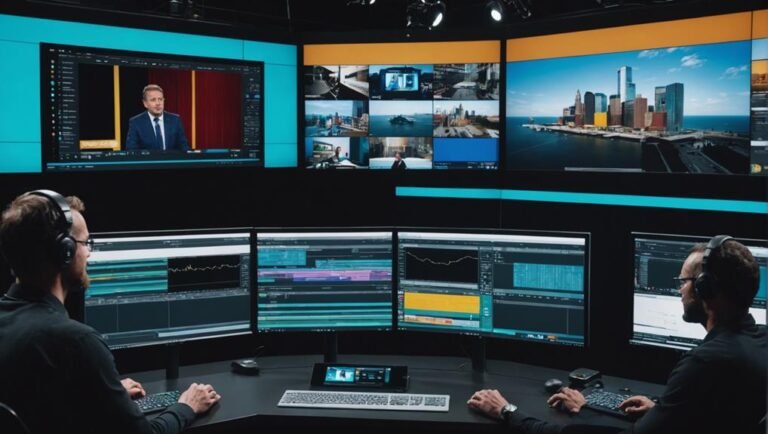Choosing between 1080P and 4K CCTV depends on your needs. 4K cameras offer four times the resolution, providing sharper images, crucial for identifying faces or license plates. However, 4K requires a substantially larger storage capacity and higher upfront costs. Installation may require upgrading your network for high-quality streaming. Conversely, 1080P cameras use less storage and bandwidth while still delivering decent image quality. For night vision, 4K excels with advanced infrared technology for better detail. If you’re considering future-proof security, 4K is the way to go. Interested in balancing budget and security needs? There’s more to explore.
Image Quality Comparison
When comparing 1080P to 4K CCTV, you’ll immediately notice a significant difference in image clarity and detail. With 4K, you get four times the resolution of 1080P, providing sharper, more detailed images. This distinction can be vital when trying to identify faces or read license plates from a distance. Imagine the freedom of knowing you can rely on your surveillance system to capture the smallest details, making your space safer and more secure.
1080P CCTV, while still effective, lacks the precision that 4K delivers. In a 1080P system, images can appear somewhat grainy or blurred, especially when zooming in on critical areas. With 4K, those concerns vanish, giving you the freedom to scrutinize every corner of the footage without losing quality. This can be particularly advantageous in high-traffic or large areas where every detail matters.
You’ll also appreciate the broader field of view that 4K cameras offer. They cover more area with fewer cameras, providing an extensive surveillance solution. Ultimately, opting for 4K CCTV means you’re choosing a higher standard of security and peace of mind. Isn’t that what everyone deserves?
Storage Requirements
One major aspect to contemplate when choosing between 1080P and 4K CCTV systems is the notable difference in storage requirements. With 4K resolution, you’re capturing an incredible amount of detail, but that also means you’re generating much larger files. These files need more space and can quickly fill up your storage devices. You might feel the pinch on your freedom to keep extensive video archives without constantly upgrading your storage solutions.
Here are some key points to ponder:
- File Size: 4K footage takes up considerably more space than 1080P, often requiring four times the storage capacity.
- Storage Duration: The duration for which you can store footage is much shorter with 4K, unless you invest in larger or additional storage devices.
- Compression: Advanced compression technologies can help, but they often come at the cost of processing power and might still not match the efficiency of 1080P.
- Bandwidth: Higher resolution demands more bandwidth for video streaming and transfer, affecting your network performance.
- Backup: Regular backups become more cumbersome with larger file sizes, requiring more robust and frequent data management.
Choosing between 1080P and 4K isn’t just about image quality; it’s also about how you manage and store your data.
Cost Analysis
Evaluating the cost of 1080P vs 4K CCTV systems reveals significant differences that impact your overall budget. When you’re looking at 1080P cameras, you’ll notice they are generally more affordable upfront. These cameras often come with lower price tags because the technology has been around longer and is more widely available. Plus, the associated storage costs are typically lower since 1080P footage requires less data.
On the other hand, 4K CCTV systems demand a larger investment. The higher resolution offers superior image quality, but it comes at a premium. You’ll need to shell out more for the cameras themselves, as well as for additional storage solutions. 4K footage takes up more space, so you’ll likely need larger or more advanced storage devices, which can further increase your costs.
However, it’s not just about the price tag. Think about the value these systems bring. 4K cameras provide clearer images, which can be essential for identifying intruders or incidents. If you prioritize high-quality footage and can accommodate the higher costs, a 4K system might be worth the investment. Balancing your budget against your security needs will help you make the best choice.
Installation Considerations
Installing 1080P and 4K CCTV systems requires meticulous planning to guarantee peak performance and coverage. You can’t just slap a camera on a wall and call it a day. Instead, think about the layout of your space and the specific areas you need to monitor. Here are some key considerations to keep in mind:
- Camera Placement: Identify high-traffic and vulnerable areas. You want maximum coverage without blind spots.
- Field of View: 4K cameras often have a wider field of view compared to 1080P, allowing you to cover more area with fewer cameras.
- Lighting Conditions: Make sure your cameras can handle varying light levels, from bright sunlight to dimly lit corners.
- Mounting Solutions: Choose the right mounts for stability and flexibility, allowing you to adjust the camera angles as needed.
- Cable Management: Plan the routing of cables carefully to avoid clutter and ensure a clean, professional installation.
Navigating these considerations effectively guarantees your CCTV system works seamlessly and offers the freedom of secure, unobstructed monitoring. Take the time to plan every detail, so you’re not left with gaps in your surveillance. The right setup today means peace of mind tomorrow.
Bandwidth Usage
When selecting between 1080P and 4K CCTV, it’s important to take into account how each option will impact your network’s bandwidth. You crave freedom and control over your security, but that freedom comes with technical considerations. 4K cameras offer stunning resolution, but they also demand noticeably more bandwidth. Typically, a 4K camera requires around 15-20 Mbps for high-quality streaming, while a 1080P camera needs only 2-5 Mbps.
If your network isn’t robust, 4K might slow it down, causing lag or interruptions. You’ll need to evaluate your current infrastructure. Do you have the bandwidth capacity to handle multiple 4K feeds simultaneously? If not, you might need to upgrade your network, which could involve additional costs and effort.
On the other hand, 1080P cameras are less taxing on your network. They offer a decent compromise between quality and bandwidth usage, ensuring smoother performance without the need for significant upgrades.
Balancing your need for high-resolution footage with available network resources is key. Assess your priorities and infrastructure before deciding. Remember, the choice between 1080P and 4K isn’t just about clarity; it’s also about ensuring your network can keep up.
Night Vision Capabilities
Night vision capabilities can greatly impact your decision between 1080P and 4K CCTV systems. If you’re someone who values freedom and wants to make sure your property is secure day and night, understanding these differences is essential.
When comparing night vision, 4K cameras often have a significant edge over their 1080P counterparts. They offer:
- Higher resolution: 4K cameras provide more detail, making it easier to identify faces and objects even in low-light conditions.
- Enhanced infrared technology: Many 4K systems incorporate advanced infrared LEDs, extending the range and clarity of night vision.
- Wider dynamic range: This helps in capturing better images in challenging lighting situations, such as shadows and bright lights in the same frame.
- Color night vision: Some 4K cameras can capture night footage in color, providing a more accurate representation of the scene.
- Smart analytics: With higher resolution, 4K systems can use advanced software to detect and alert you of suspicious activities more effectively.
Use Cases
Whether you’re securing a small home or a large commercial property, understanding the use cases for 1080P and 4K CCTV systems will help you choose the right solution. For a cozy home, 1080P cameras often do the trick. They provide clear footage, are generally more affordable, and easier to install. If you need to monitor a driveway, front porch, or backyard, 1080P offers sufficient detail to identify visitors and keep an eye on activities without breaking the bank.
On the other hand, if you’re managing a large commercial property, 4K CCTV systems can offer significant advantages. With higher resolution, 4K cameras capture more detail, making it easier to identify faces and license plates from a distance. This level of detail is essential for large spaces like warehouses, parking lots, or office buildings where you need to cover wider areas and require sharper image quality.
Additionally, 4K systems are ideal for high-risk areas where every detail counts, such as banks, casinos, or retail stores. They provide superior image clarity, which can be invaluable for preventing theft and ensuring security. Ultimately, your choice will depend on your specific needs and the level of detail you require.
Future-Proofing
Investing in a 4K CCTV system today means you’re preparing for future technological advancements and increased security demands. As technology evolves, so do the capabilities of surveillance systems. By opting for 4K now, you’re guaranteeing that your setup won’t become obsolete anytime soon. This not only saves you money in the long run but also gives you the peace of mind that your security measures are excellent.
Consider the following benefits of future-proofing your security with a 4K system:
- Higher Resolution: Captures more detail, making it easier to identify faces or license plates.
- Enhanced Digital Zoom: Even when zooming in, you won’t lose clarity, unlike with lower resolution cameras.
- Better Integration: As new tech emerges, 4K systems are more likely to seamlessly integrate with future upgrades.
- Improved Storage Solutions: With advanced compression methods, 4K cameras can store high-quality footage without eating up all your storage space.
- Scalability: Expanding your system later is easier without needing to replace existing cameras.
In a world where security is paramount, investing in 4K CCTV ensures you’re not just keeping up with the present but are ready for whatever the future holds.
Frequently Asked Questions
What Is the Lifespan of P Vs 4K CCTV Cameras?
You’re wondering about the lifespan of CCTV cameras. Typically, both standard and 4K models last around 5-7 years with proper care. Keep them well-maintained, and you’ll enjoy reliable surveillance without feeling tied down by frequent replacements.
Are P and 4K CCTV Cameras Weather-Resistant?
You bet your boots, those cameras can handle the elements! Both types generally come weather-resistant, giving you the freedom to place them wherever you need without worrying about Mother Nature’s surprises. Stay secure, rain or shine.
How Do P and 4K CCTV Cameras Handle Privacy Concerns?
You should know privacy’s a top priority. Both types of cameras come with features like encrypted feeds and customizable privacy zones. You can control what’s recorded, ensuring your freedom isn’t compromised while maintaining security.
What Are the Maintenance Requirements for P Vs 4K CCTV Cameras?
You’ll need to regularly clean and update both types of cameras. 4K cameras might demand more storage and processing power, while P cameras usually require simpler upkeep. Choose based on your tech comfort and maintenance preference.
Are There Any Compatibility Issues With Existing Security Systems?
When you embark on upgrading, compatibility can be a tricky road. Not all old systems play nice with new tech. Always check your gear’s specs to guarantee a smooth switch and keep your security seamless and hassle-free.



